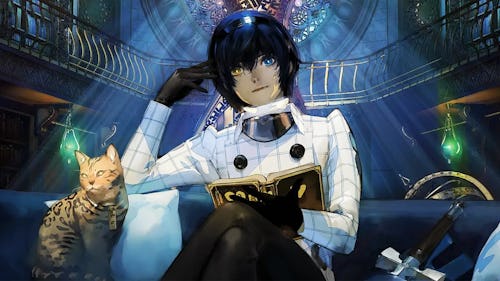
A failed assassination attempt only gives the populist candidate more fuel for his fire — a new momentum that surges him to the top of the most important election the world has ever seen. This could describe the 2024 election in the United States of America, but instead it is part of the plot for the Japanese role-playing game Metaphor: ReFantazio, released in October but written long before the ticket of either American political party was set.
On one hand, it’s a complete coincidence Metaphor came out in such a politically-charged year. On the other hand, there’s an intentionality to the game’s design that makes it a biting piece of criticism for the modern age — not just America, but the world at large.
“While we did not depict contemporary political arguments or their context in this game, we wanted to provide an element that would make each player think about the heroism of influential figures in a fantasy world, as people entrust or are entrusted by others with their anxiety or concerns,” Metaphor creative director Katsura Hashino tells Inverse. “We made elections an important element of the story because we wanted to portray the complexity of modern society and how people’s choices affect it.”
“We always wanted to create a theme about how people confront anxiety — an emotion that people deal with in the modern age.”
In a year packed with incredible video games, it’s the dedication to tackling lofty ideals and issues that make Metaphor the most important game of the year. Metaphor never shies away from touching on real, deep-rooted societal problems, deftly reflecting those through the lens of a grand fantasy world. Metaphor is a defining piece of art that’s going to be talked about for years to come
The Anxious Wellspring
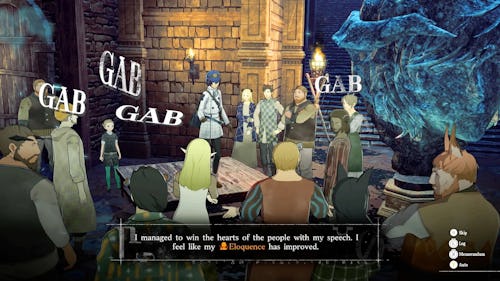
Metaphor takes place in a medieval fantasy realm called the Kingdom of Euchronia, directly after the king, Hythlodaeus V, has been assassinated. However, the king put a safeguard in place, a magic spell that launches a competition for the throne — where whoever wins the most support from the people will be crowned the next king. That brings the theme of election to the forefront, a device Metaphor uses to deal with so many other topics, from racism and prejudice to the anxiety they create. It’s a fantasy game that reflects our reality, and Metaphor was meant to be that from the moment it was conceived.
“From the beginning of development, we always wanted to create a theme about how people confront anxiety — an emotion that people deal with in the modern age,” Hashino says, “We first built a fantasy world affected by the emotion of anxiety and began to create a story, then flesh out the people who live in that world and the journey of the protagonist.”
All the while, Metaphor doesn’t hide what it is — a metaphor for the real world, where dangerous bloodthirsty monsters named “Humans” roam the land, where distrust of elected officials runs rampant, and fantasy books depict a cityscape where everyone lives in harmony. The themes of Metaphor might not be subtle, but the execution is. Plenty of games use racism or social injustice as thematic dressing, but in Metaphor these are meaningful parts of the world that are constantly factored in, whether it’s at hour ten or one hundred.
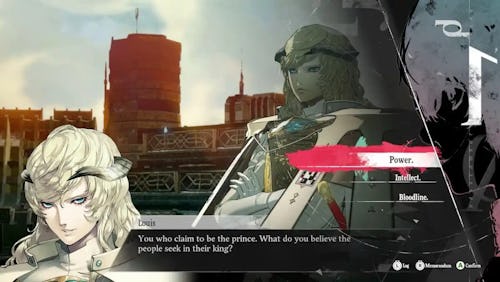
The world of Metaphor is made up of nine wildly different tribes of people, and prejudice and discrimination run deep because of those differences. You play as a young boy of the Eldean tribe, largely ostracized and seen as freaks. Everywhere you go in the game your character is constantly subjected to prejudice, from NPCs instantly distrusting you based on your appearance to deep-rooted systemic issues in the world’s ruling bodies.
“If we could create a fantasy game where fantasy is not just an escape from reality or a pictorial illusion, but a story that could empower modern-day people, it would be a game with our unique approach,” Hashino says. “And by doing so, we aim to offer players a new perspective.”
Throughout the development, there were checks done both within the team and without to make sure these themes were handled appropriately. This approach drew feedback that lead to Metaphor to opting for “tribes” rather than races for its world. This was because the team wanted its tribes to be based on feelings that are inherent to people, rather than just characteristics. Hashino explains that the tribes of Metaphor are often based on personality traits that tend to be used as “labels” in Japanese society, such as “not expressing what you’re thinking, only listening to other people’s opinions and not having your own, and imposing old ways of thinking on a new generation.” In this way, Metaphor is especially reflective of Japanese society, but it’s a universal idea that can apply to anyone and everyone.
Persona Non Grata
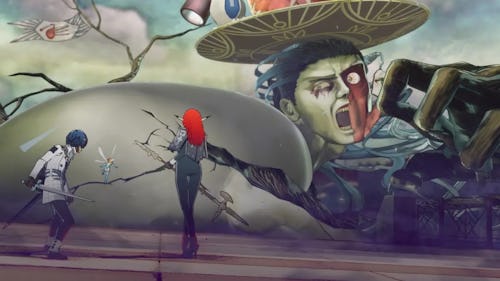
Metaphor is an advancement of the ambitious storytelling Atlus’ Persona franchise has been doing for decades. Persona, of course, focuses on Japanese high-schoolers with a kind of paranormal twist, and similarly touches on relevant societal issues.
Even though Metaphor opts for a fantasy world, a lot of the game’s structure is drawn directly from Persona. A game as pivotal as this is built on iteration and experimentation, but also a desire Hashino had to answer a burning question.
Metaphor is unmatched by anything else this year in the way it layers multiple realities on top of one another
“The project began with a question to the team members: ‘What genre of RPG do you want to make?’ Everyone agreed that they wanted to make a fantasy RPG, something they grew up with. But when we got deeper into the discussion of why they like fantasy, no one had a clear answer,” Hashino says, “That’s what I found so interesting, and I remember being curious ‘Why are we subconsciously drawn to fantasy worlds, without knowing the exact reasons?’ That curiosity led me to challenge myself to explore more complete and deeper social themes, making the most of my experience with the Persona series.”
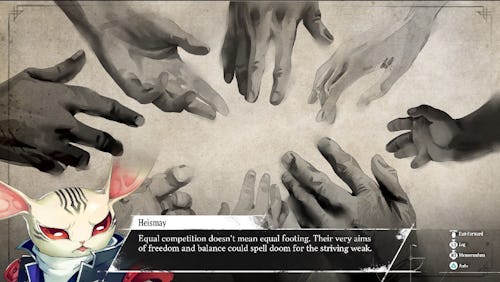
There’s a clear line to draw from Persona’s narrative ambitions to Metaphor, but that idea also applies on a mechanical level. Much of Metaphor’s gameplay systems are put in place to reinforce its narrative and topical themes, and that’s perhaps best represented by the game’s passage of time. Just like Persona, the story plays out on a calendar system, letting you go through each day across a matter of months.
In Persona the calendar system accentuates the idea of school life, of wasting away the days with friends, part-time jobs, and just chilling on the couch. The time management adds a sense of tension and anxiety that permeates the story — playing into the idea of seeing your youth slip away, day by day. But in Metaphor it serves a different purpose, cementing the ticking clock of an election cycle as a backdrop to your everyday decisions — no matter how distant they seem from the larger political picture. It’s a device that creates inescapable anxiety, pulling you away from the joy of the journey and reminding you of the world outside that you cannot control.
Every Adventure Requires A First Step
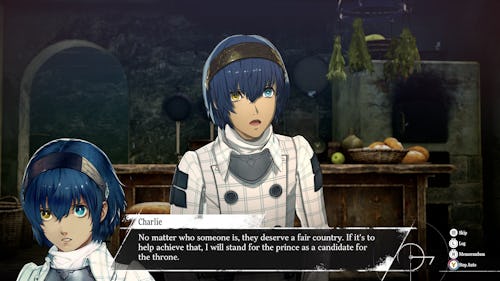
Metaphor is unmatched by anything else this year in the way it layers multiple realities on top of one another. There’s the political reality that is nearly prescient and so very reflective of the modern world. There's the emotional reality, the subjective way people interpret the events in the world. There's the way we talk about reality, with half-truths, sparring points of view, and outright lies. And then there's the personal journey — the steady march forward that one must take on in life as they grow and watch the world change.
“The journey is a microcosm of ‘life’ in which there is a beginning, various encounters and realizations, and then an end.”
“When people travel these days, they decide where to go for tourist spots and in what order to make their trip more efficient. Planning these itineraries can be part of the enjoyment of a journey,” Hashino says. “This system is designed to reinforce the themes of the narrative and allow players to be more deeply involved in the development of the characters.”
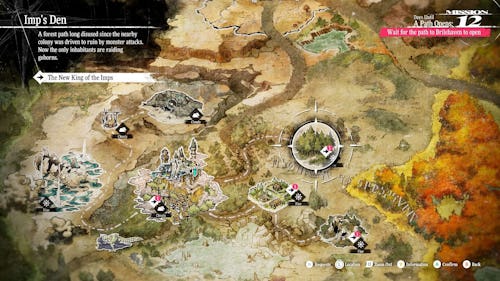
And the story of the characters, Hashiro points out, are nothing more than a metaphor in and of themselves. “At its core, the journey is a microcosm of ‘life’ in which there is a beginning, various encounters and realizations, and then an end,” Hashiro says. “Within that microcosm, my intention was to depict ‘heroism’ within a person who has the will to face his or her anxiety, respect others, and never stop progressing for the sake of happiness.”
In the reality of video games, where mechanics and narrative are both their own kind of truths, Metaphor is a seminal title — an undistilled look at the storytelling potential afforded to this medium. Metaphor shows how games can offer both escapism and connection to the world at large. As Hashino puts it, “Video games are a powerful way to communicate social opinions and issues because, unlike other media, they allow players to be directly involved in the story. Interactivity allows players to experience and better understand the message through their own choices.” In the chaotic fog of our own realities, this is one message that clearly shines through.
Metaphor: ReFantazio is available on PS4, PS5, Xbox Series X|S, and PC.
FTTT
0 Comments